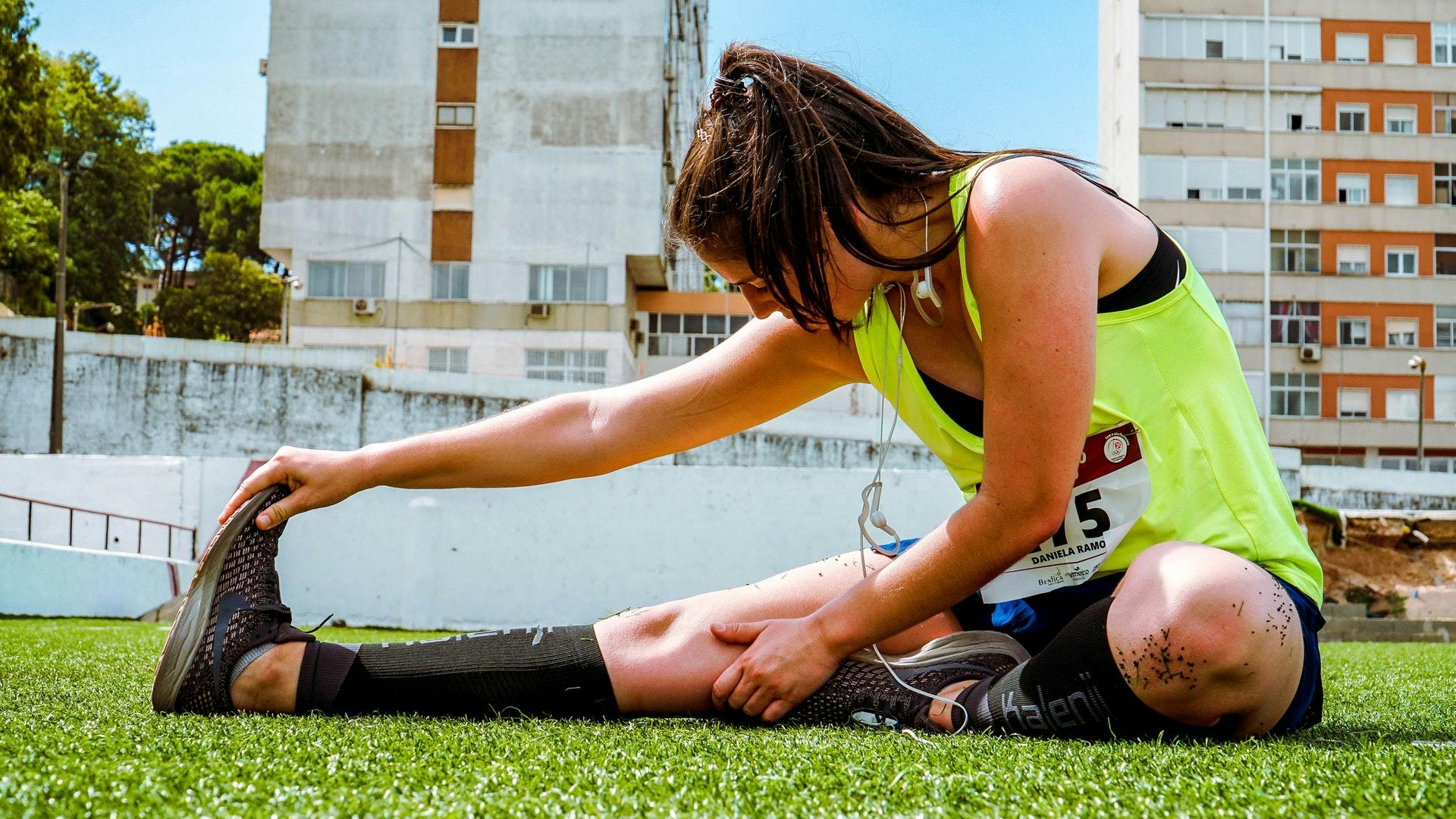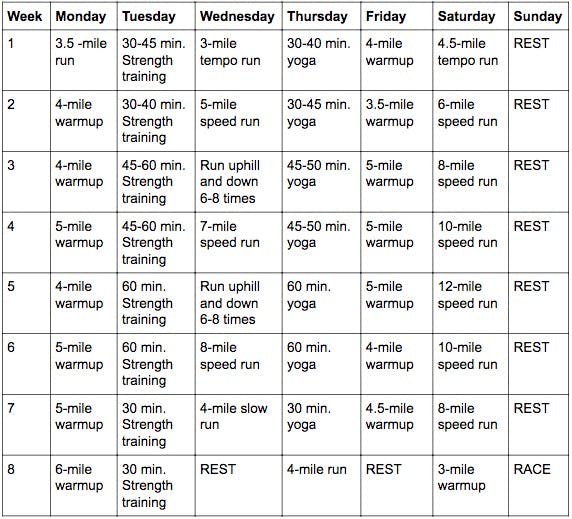Get Race-Ready With Our 8 Week Half Marathon Training Plan
June 4th 2020
8 Week Half Marathon Training: Where to Start
You’re considering running a half marathon, but you’re unsure where to start. I get it, that’s why you’re here. Having the right training plan when you’re preparing to run a half marathon is the key to your success.
A half marathon generally sits somewhere around 13.1 miles, so this is no small feat. You need to have the right strategy behind you if you plan on accomplishing your goals. First off, you should have run your fair share of 5Ks and 10Ks by this point. If you've never run a 5 or 10K, you might want to consider doing that first. The training is less involved, and the run itself is shorter.
If you’re ready to jump into a half marathon with both feet, I’m here to help you with some great tips and training ideas to get you started. Grab a couple of bottles of water and learn how you can prepare yourself for a half marathon in barely two months.
Related: Why the Half Marathon Might Be Your Jam
What we will cover in this 8 week half marathon plan:
- Prepping
- Schedule
- Race day
8 Week Half Marathon Training: Prepping
There are various reasons why people run half marathons, but regardless of your goal, it brought you here. The first thing you'll need to do before you even think about training is to get yourself into the right headspace.
You need to have a particular mindset to run a half marathon because it's not something that everyone can do. One you feel like you're mentally prepared to push yourself to the limit, you want to prepare differently. There are some necessary steps you want to take to ensure you're ready to train for a half marathon.
Have the Right Gear

The first step you should take is to throw out the loafers and get yourself a pair of high-quality running shoes. Even if you have some experience running a 5K you want to take your comfort to the next level with a half marathon. This is a 13 mile run so you need special running shoes that will provide you with a maximum level of comfort throughout the entire run.
Another point to note is that you want to break these shoes in plenty before hitting the pavement on race day. Make sure you wear them during your training, so you know if they are the right fit for you. They’ll take some time to break in and you don’t want to get blisters during the run.
Related: Shoes or LOSE
Stay on Track
Running a half marathon is all about discipline. Training for a marathon is also about control so that should be the most important word that you keep in your head throughout the entire process. You want to follow a smooth and steady approach with your training and make sure you never divert from the course you're on. Stay focused and keep your base mileage, speed, long runs, and recovery in mind at all times.
One crucial factor of discipline is consistency. Once you start losing track of the data and you stop training regularly, you’ll have to start all over. Make sure if you set your mind to an eight week half marathon training plan you stick with it from beginning to end. You’ll be thankful you did on race day.
Related: Want to Get Better? Get Consistent
Build Yourself Up
If you ask any professional trainer, they’ll tell you that the key to success is not to overwork yourself in the beginning. How many people have you seen start a training plan and work themselves to the bone for three days and then give up? This happens all the time because people don’t have a proven training strategy right from the beginning. Don’t expect yourself to run 10 miles every day in the first week; start small and build yourself up towards your goals.
That is why I suggested that you run a few 5K or 10K races if you haven't already. These runs will prepare you for the big one, which will prepare you for bigger ones after that. Long-distance running is best for people who run regularly.
If we go back to the consistency point, while you don't want to work yourself too hard in the beginning, you have to build up your mileage over time. Increase your mileage volume by no more than 10% every week. Doing this will allow your body to adjust to the changes naturally.
Drink Plenty of Water

Water is essential to staying injury-free and healthy during your training. If you don’t have enough water, you’ll experience cramping, dizziness, and fatigue. These three issues will kill your half marathon dreams and leave you feeling hopeless. The best marathon and long-distance runners have a plan for how much water they want to drink based on how far they plan on running. You want to keep yourself plenty hydrated leading up to each training, and you want to hydrate consistently throughout the run.
Going hand in hand with water is your overall eating and drinking habits. During your training, it’s best to stay away from alcohol. If you plan on training consistently during these eight weeks, a night out could completely kill your chances of running the next day, which may spiral out of control.
You also want to keep track of what you're eating leading up to race day. Make sure you intake plenty of protein and limit the amount of greasy, fatty foods you're eating.
Related: Want to Run Well? Eat Anti-Inflammatory Style
Switch It Up
Add variety to your workouts not only for endurance purposes but for fun as well. If you feel like eight weeks of long-distance running might get tiring or even dull, consider switching things up and adding in other high-intensity interval training, strength training, or cool down with some yoga. Depending on your interests, you can choose whatever other workouts you want to do.
The ultimate goal for marathon runners is to become the best all-around athlete they can, and you should have that mentality too. You can learn to run incredible distances, but it doesn’t matter if you don’t have enough upper body strength. On the flip side, you have people with a ton of strength training that can barely walk to their car without breaking a sweat. Everything needs to remain consistent when you’re training for a half marathon.
Understand Stretching

The worst thing that can happen is you pull a muscle and become unable to train for a few days. That will set you back, and if it's close to race day, it might even put you out. Stretching is incredibly critical to your success as a marathon runner, so you want to take this seriously. There are many different stretching exercises and strategies out there, so you want to find the one that works best for you and stick with it!
When should you stretch?
Make sure you stretch before each session, before every run, and after any workout you do. Many people forget to stretch after or they don't think about it, but you can pull a muscle after your workout when you're doing something you would typically do. I've pulled muscles after running from merely getting out of my car after the gym.
When Should You Rest?
Although you're running a half marathon, it's a full marathon sized challenge, so you have to go easy on yourself every once in a while. This is an incredible feat, and you deserve a break every now and again, whether that be an easy run day or no running at all. You don't need to exercise everyday during your eight weeks.
If you wake up one morning and you are not feeling like it, give yourself that reward and hit the snooze button. If some friends invite you out when you’re supposed to be training, go out and worry about training tomorrow. Don’t make training for a half marathon your number one priority. You need to allow your body to recover and stay at peak performance level if you’re going to have success on race day.
Related: Why You Shouldn’t Skimp on Sleep During Training
8 Week Half Marathon Training: Schedule
The key is to turn your body into a well-oiled machine and have the right training plan scheduled out. You want to know exactly what you have to do each day, so you don't have to think about it.

Week 1 Training

- Monday: 3.5-mile warmup
- Tuesday: 30-45 minutes of strength-training exercises (lunges, squats, overhead presses, and planks)
- Wednesday: 3-mile tempo run
- Thursday: 30-45 minutes of yoga or pilates
- Friday: 4-mile warmup
- Saturday: 4.5-mile tempo run
- Sunday: rest day
Week 2 Training

- Monday: 4-mile warmup
- Tuesday: 30-45 minutes strength-training exercises
- Wednesday: 5-mile speed run
- Thursday: 30-45 minutes of yoga or pilates
- Friday: 3.5-mile warmup
- Saturday: 6-mile speed run
- Sunday: off day
Week 3 Training

- Monday: 4-mile warmup
- Tuesday: 45-60 minutes strength-training exercises
- Wednesday: Run uphill and back down 6-8 times
- Thursday: 45-50 minutes of yoga or pilates
- Friday: 5-mile warmup
- Saturday: 8-mile speed run
- Sunday: off day
Week 4 Training

- Monday: 5-mile warmup
- Tuesday: 45-60 minutes strength-training exercises
- Wednesday: 7-mile speed run
- Thursday: 45-50 minutes of yoga or pilates
- Friday: 5-mile warmup
- Saturday: 10-mile speed run
- Sunday: off day
Week 5 Training

- Monday: 4-mile warmup
- Tuesday: 60 minutes strength-training exercises
- Wednesday: Run uphill and down 6-8 times
- Thursday: 60 minutes of yoga or pilates
- Friday: 5-mile warmup
- Saturday: 12-mile speed run (start reducing distance for race day prep)
- Sunday: off day
Week 6 Training

- Monday: 5-mile warmup
- Tuesday: 60 minutes strength-training exercises
- Wednesday: 8-mile speed run
- Thursday: 60 minutes or yoga or pilates
- Friday: 4-mile warmup
- Saturday: 10-mile speed run
- Sunday: off day
Week 7 Training

- Monday: 5-mile warmup
- Tuesday: 30 minutes strength-training exercises
- Wednesday: 4 miles slow run
- Thursday: 30 minutes of yoga or pilates
- Friday: 4.5-mile warmup
- Saturday: 8-mile speed run
- Sunday: off day
Week 8 Training

- Monday: 6-mile warmup
- Tuesday: 30 minutes strength-training exercises
- Wednesday: rest
- Thursday: 4-mile run
- Friday: off day
- Saturday: 3-mile warmup (take it easy!)
- Sunday: Race!
Day Before the Race: How to Prepare

When it’s almost time for the race, make sure to prepare your body by getting enough sleep and eating right. Don’t make any sudden changes to your sleep schedule and eating habits. Make sure to get enough energy by consuming a good amount of carbohydrates and drinking enough water. Once again, your three-mile warmup on Saturday doesn’t need to be too intense. Take it slow and focus on form.
Plus, don’t forget to prepare mentally! Clear your mind by reading a book, disconnecting online, or taking some time for yourself. Focus on staying calm and reducing your anxiety. Pacing yourself begins before the race starts.
8 Week Half Marathon Training: What’s Next?
After implementing this training plan and all the tips above, you should have no problem running a half marathon. Remember, don’t overwork yourself. You don’t want to strain a muscle before the big day! If you aren’t already able to comfortably run for 6 miles at a time, try a longer marathon training program.
Don’t forget to eat healthily and drink plenty of water to give your body all of the nutrients it needs to stay energized and focused during your training. Check out our SportMe app to stay motivated and track your progress. Remember the two keys to your success are discipline and consistency. When you combine them, you become unstoppable! Good luck!
